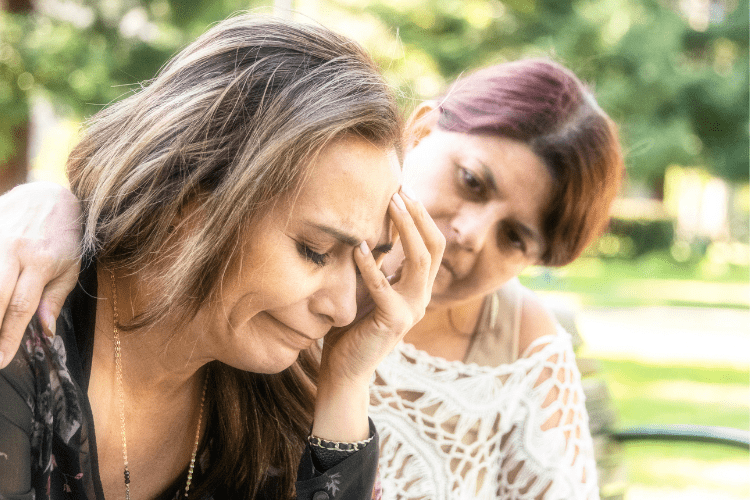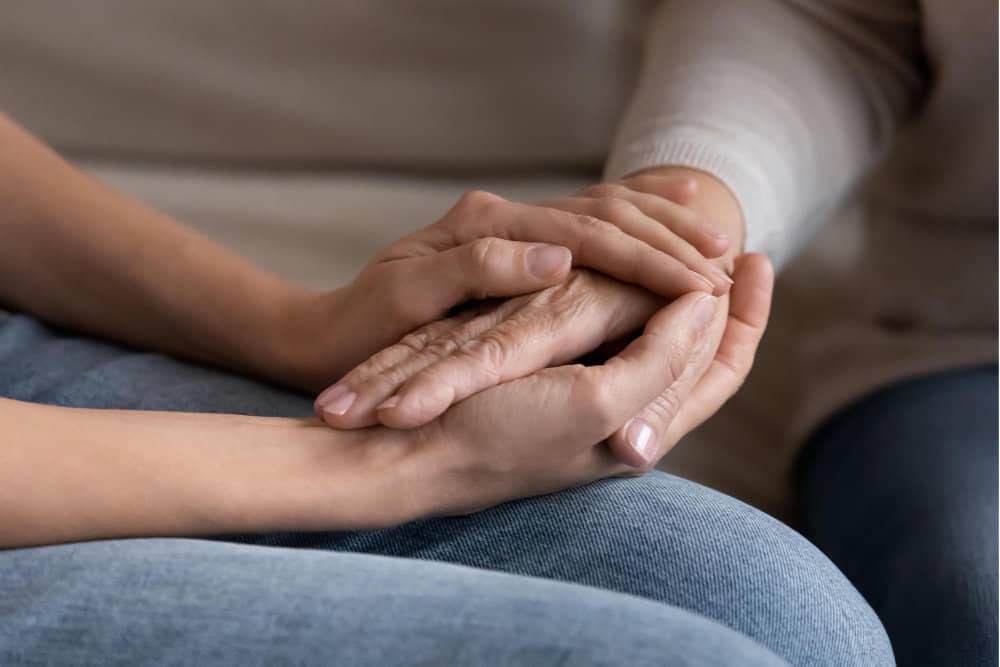Last Updated on August 15, 2023 by Angela Vaz
It’s probably one of the most heartbreaking experiences I’ve faced that doesn’t involve me personally.
When you watch your friend grieve and slowly cut out ties with everyone, it can hurt.
It hurts really bad.
And it’s quite common.
I myself have cut myself off from everyone when I was going through depression and I know what it feels like.
In this post, I want to discuss what to do when a grieving friend pushes you away.
I talk about the why and I’ll help you understand what you can do to truly help your friend without compromising your mental health.
Because you can’t pour from a cup that’s empty.
You need to take care of yourself too if you have to care for someone else.
Let’s begin.
But before that really quick, get my free guide on how to really reset your life.
This post contains affiliate links, meaning I may make a commission at no extra cost to you if you decide to click on a link and purchase something. Click here to read the full disclaimer.
Why do grieving people push loved ones away?
Before I talk about how you can help a grieving friend, I want to talk about why people who grieve push others away.
My mom (whom I loved to the moon and back) did this when she was fighting cancer.
She pushed all her loved ones away and felt like she wanted to fight her cancer on her own.
My friend who is currently going through depression is also doing the same.
So, the question is when people are depressed, why do they feel like they need to fight it alone? Why do they push loved ones away when they could do with a little help?
Let’s look into that.
1. They are tired

Because they are battling something that is enormous and heavy, they just don’t have the energy to pretend to be nice or engage in small talk.
They can’t really think about anything else apart from what is currently going on and they don’t want to try.
They don’t have the energy to focus on anyone else’s problems or listen to something that is strenuous or heavy – they feel too drained for that.
2. They are emotionally unstable

When a person is going through bouts of depression, they can be moody, cranky, sad, or angry.
It comes in waves and it is often unpredictable.
The smallest nuance can tick off an unprecedented emotion and deep down they’re worried that they’ll lash out at you for something that is not your fault.
They are scared they’ll hurt you by becoming angry or upset at the smallest thing.
This is one of the main reasons why people who are grieving or depressed prefer being by themselves.
3. They don’t feel like themselves

I have a friend who is going through marital problems.
She stopped hanging out with friends because she feels like she is not herself.
She feels the problem is temporary and she wants to solve it before she mingles with people.
She’s never felt this sad and gloomy and she just doesn’t want people to see her this way.
My mum was the same.
She saw what the cancer was doing to her and she refused to pull other people into what she felt was a tornado of darkness and misery.
She wanted to battle it on her own.
When people grieve, they feel like they’re not worth being around.
They feel like they’ll bring others down with their sadness so they often try to battle it alone.
4. They feel like they are a burden

They feel like they’ll be a huge disappointment to others if they try to mingle or start conversations because they just won’t be their best selves.
They feel like people are calling them only because they are trying to be nice or trying to include them in conversations and festivities and they’re doing it out of duty.
They don’t want favors and they certainly don’t want to be pitied.
That’s the last thing people who are grieving want.
They want to figure out a solution and they want to try to become better.
These are the main reasons why grieving friends push people they love away.
So, what can we do to help them?
Let’s dive in.
What to do when a grieving friend pushes you away? 7 Heartwarming ways to help
1. Let them know they have a safe space with you

First, identify if your friend is grieving and depressed.
Some signs to look out for are:
- They stop engaging with friends and inner circles – they withdraw completely
- You don’t hear from them even on social media – it’s like they’ve disappeared
- They are aloof and turn down any social events (something they didn’t do before)
- They have zero interest in any activities that they enjoyed before
- They don’t talk about future goals or plans
- They seem distant and aloof
If your friend is displaying all these signs, you can be sure that they are grieving.
In this case, just let them know that you are available to talk.
Tell them something like:
“I’ve noticed that you’re going through something lately and I know it’s hard. I’m here if you need me to talk. You can call me anytime. I care for you.”
Don’t be nosy, and don’t sound curious.
Just let them know that you are available to talk if they need a sympathetic shoulder to learn on.
2. Listen without judging them

If they do reach out to you, listen.
Listen without judgment.
My friend who was going through depression came out of a bad relationship.
Everyone including me had told her to not jump into it because we all saw the red flags of the man that she missed.
But she went ahead anyway and it burned her badly.
She is now grieving the loss of that relationship.
It’s easy to tell someone to get over it but don’t.
Don’t say things like:
- “It will pass.”
- “It’s a part of life. Nobody lives forever.”
- “There is a silver lining, you just need to see it.”
- “They are in a better place.”
- “Maybe this was God’s will.”
- “One day you’ll look back on this and it won’t be so bad.”
These statements are not reassuring and they’re not going to help.
The idea is not to put them down but to be there for them.
So, instead of telling them to look on the bright side or see the silver lining, say things like,
- “I understand you’re hurting. I know this is hard.”
- “This must be a difficult time for you.”
- “I’m sorry this happened.”
- “I am here for you.”
Listen without judgment.
Listen without giving advice.
Just be there for them – they just want someone to understand and listen to what they’re going through.
3. Don’t give advice

We love solving problems.
Sometimes when other people are having problems, we can’t understand why they cannot see the solution when it’s so clear to us.
But this is not the time to give advice.
They aren’t going to take it well.
When people are grieving, they are grieving a loss that only they know.
When you give advice, they’re going to take it badly and feel like you’re belittling their grief.
Don’t compare their grief to yours in any way even if you’ve gone through a similar experience.
They are not going to find it helpful.
Unless they ask you about your experience and ask you for advice, don’t compare or bring up the past.
Instead of giving them advice, tell them you understand how they feel.
Tell them it’s okay to grieve and they are allowed to feel the loss of whatever they are going through.
Validate their feelings.
4. Help them out in little ways

If they are a close friend, send them a meal.
Sending them a meal or cooking for them not only tells them that you love them but also tells them that you care for their well-being.
If they have secluded themselves, don’t go over to their house. They may want to be alone and not entertain anyone at the moment.
Ask if you can drop by.
If they have children, offer to babysit or help out around the house.
Maybe you can help them do a load of laundry or pick up their dry cleaning or drop them off at their place of work.
Some people aren’t comfortable with phone calls – in that case, send text messages.
Just let them know that you care and you are thinking of them.
5. Don’t take anything they say personally

My mom said many things to my dad and me when she was dying.
I knew it was because she was scared and a huge part of her felt like she was losing us.
I never took it personally.
Everyone deals with grief differently.
Some people need a shoulder to cry on and some people want to be alone.
If your friend says something mean or behaves moody – don’t take it personally.
Understand that it’s just their grief talking.
6. Don’t abandon them

Some people are uncomfortable with topics of death and it can be natural to just slip away and not contact them for fear of saying something wrong.
But this is only going to strain your relationship with the person.
I remember one of my classmates who lost her brother when she was in the 9th grade.
She told me that almost everyone stopped talking to her after her brother died and she felt really bad.
I was one of those people because I didn’t know what to say.
It can be hard to deal with someone who’s grieving.
But as long as you keep checking in on them and letting them know that you’re there for them, it will make a huge difference to this person.
7. Be patient

As I said earlier, everyone deals with grief differently.
It’s almost 2 years since I lost my mom, but my dad still grieves for her. He still mourns her loss and he talks about it as if it’s happened yesterday.
People may appear normal and go about their daily routine, but deep down they may take a lot of time to come to grips with their pain.
And some people take longer than others to get over the loss of someone.
So be patient.
Just make sure that you’re available to talk.
Listening is the best gift you can give someone that is grieving.
Give them time.
I usually just check in on my dad and talk about random things like the weather or politics.
You can talk about random things and let them know that you care. That’s what love is all about.
Takeaway
If your friend means a lot to you, make an attempt to stay in contact.
Do not hold back or give them space unless they specifically ask for it.
Let them know you are there for them.
Let them know you care.
If you feel they are slipping down into harmful thoughts and actions, then direct them to counseling or therapy.
Here are more posts you may find useful:
- 37 ways to spend Christmas at home
- 12 warm ways to spend Christmas with your dog
- 33 ways to be a genuinely nice person
- 13 genuine ways to make each day count
- How to make a plan and stick to it
- 13 easy ways to plan for success in the future
- 17 small things successful people do every day
- 35 honest ways to get your life together



